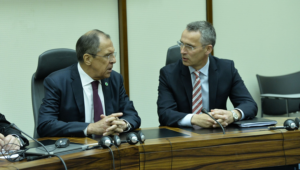
Russian Minister of Foreign Affairs Sergey Lavrov (left) and NATO Secretary General Jens Stoltenberg in April 2016 (credit: NATO)
The rise of rightist politics in Central Europe. Western troops stationed in Poland and Lithuania. American tanks rolling in Moldova and Georgia. Russian fighter jets buzzing U.S. Navy ships in the Baltic and Black Seas. Missile shields installed in Romania and Poland.
A script for the next Hollywood blockbuster? No. This is happening today; just read the news. The question is, how do we reduce the risk of provocation that may lead to a tragic outcome, be it an isolated incident or the outbreak of conflict.
The narratives are old—an increasing number of professionals have no memory of the Cold War—yet, for some reason, persist. Russia, with its myriad borders and massive WWII death toll, continues to worry about foreign encroachment, and does not shy from lashing out when it feels threatened. U.S. and European diplomats, some acting like missionaries for democracy and human rights, equate authoritarianism with immorality and are intent on, in their view, saving the unenlightened.
Trust will be a long time coming. Centuries of suspicion and perceived division between Russia and the West, with roots in religion and geography, are not healing easily. While continued attempts at dialogue seek that elusive common ground, some transparency and risk-reduction measures are in trial mode to keep open channels.
In 2015, NATO invited Russian personnel to attend various military exercises. In October, Russian soldiers received a briefing in Italy at the NATO exercise Trident Juncture. Earlier this month, Russian representatives visited training areas in Estonia related to the NATO exercise Spring Storm 2016.
Lt Gen Ben Hodges, who heads U.S. Army Europe, supports such exchanges. “It would lower their anxiety of what we’re doing. And I think Russia could help if they do the same thing,” he said, adding that “that would be a good step right there to reduce tension.”
In 2002 a NATO-Russia Council was formed, a work group that welcomes Russian representatives to discuss military issues with the alliance, yet this was suspended in 2014 after Russia’s Crimea takeover. The council resumed discussions on April 20, though with little progress.
“NATO and Russia have profound and persistent disagreements. Today’s meeting did not change that,” commented NATO Secretary General, Jens Stoltenberg.
A long-term goal for resolving the political divide is equally if not more important. Wendy Sherman, a former U.S. State Department negotiator who recently worked on the Iran talks to lift sanctions, recently published a policy brief on the role of political forgiveness in resolving longstanding conflicts. “The inability to overcome longstanding grievances—however justified and deeply rooted—often undermines a group’s or nation’s current core interests,” she writes.
Continued animosity between Saudi Arabia and Iran, India and Pakistan, Kosovo Albanians and Serbs, and the standoff between Armenia and Azerbaijan are just a few examples of rifts that continue due to the ‘enemy narrative’ in the minds of opposing sides. In Sherman’s words, “Deep animus often seems to take precedence over interests.”
Some international observers would argue that, rather than having to resolve any historical angst or paranoia about invasion, the Russian government simply needs to come out of the 19th century. President Putin’s single-party politics and ‘command capitalism’ certainly puts national interests first, albeit at the cost of political reform.
Meanwhile, NATO formally extended an invitation to Montenegro on Thursday, and reports indicate that the alliance is considering offering partnership agreements to Ukraine and Georgia at the upcoming Warsaw summit in July. On the map, member countries form an unbroken north-south chain from the Baltics all the way to Turkey.